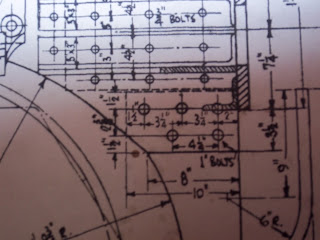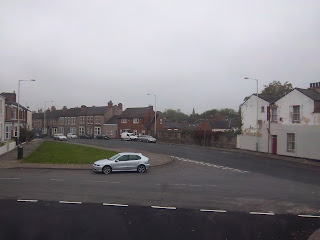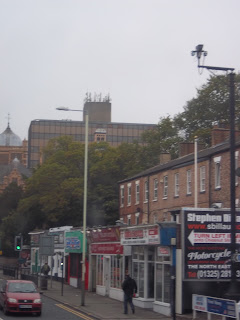For those of you who don't already know, last weekend I went to Darlington to attend the 25th anniversary of the A1 Steam Locomotive Trust (remember my earlier post,
London and North Eastern Railway Peppercorn class A1 60163 Tornado?) and to see the locomotive I'm sponsoring, no. 2007 Prince of Wales. I had to fly on Easyjet because they're the only airline brave enough to accept 15-year-olds and so then we had to choose between the Fiumicino (Rome) and the Galileo Galilei (Pisa) airports. The schedules worked out better at Pisa, so I flew out frome there. I was to meet James Gibb (an English mathematician who comes to Todi every so often for a few weeks; inevitably we have become good friends) at London Luton. I would spend my two nights in England with him and his lovely wife at their house, and on Saturday he would take me to Darlington and suffer several boring (according to him) talks...and then he would take me to York to go spend some time at the
NRM. When they told me, they also told me I had to figure out how to get to Pisa by myself. I ended taking 4 trains and 1 bus there, and 3 trains and 1 bus back. With 8-15 minute changes. I'm going to give you what my darling mother calls a "picture essay".
 |
| The dress code for the convention was suit, tie, etc. so I wore my jacket and the lesser of my two nice black shirts on the journeys to and from London, and the greater shirt in Darlington. |
 |
| I look huge and intimidating in these photos. |
 |
| That's better. |
 |
| As you can see, I left in the morning. |
Following are my modes of transport:
 |
| Fiat 500 F |
Umbria mobilit
à regionale:
 |
Automotrice FCU ALn 776 n0. 009- built by Fiat
|
 |
| Half of one car... a quarter of the train |
 |
| This is the regulator barrel. Each slot corresponds to a motor, or gear if you like, and the further up the slot the regulator arm is, the more power is applied. You can see the arm to the left with a black knob at the end. |
 |
| one car |
 |
| the other car |
Regionale Veloce:
 |
| the inside of a car |
Intercity: the loco and cars are from the '80s
 |
| class E. 402A no. 033 |
 |
| Compartments! Remember them? |
 |
| yup, from the era when you could see the tracks rushing past when you flushed the loo |
 |
| part of a poster with(from left to right, increasing number of stations visited, decreasing speed) Frecciarossa, Frecciargento, and Frecciabianca |
 |
| my compartment |
 |
| Note the fact that the window on the other side of the corridor aligns perfectly with the compartment. Also note the compartment controls above the door. |
 |
| Each person has their own reading light |
 |
| At the front of the train looking at the loco through dirty glass. |
 |
| coupler |
 |
| you can see a tread on the buffer for workers (cleaning, maintenance, etc.) |
 |
| brake hoses |
 |
| Nice use of parallelograms! |
 |
| pantograph and cyclops headlight |
 |
| electrical connection |
 |
| you can see the pilot down under the buffer-beam. |
 |
| The rungs are for cleaning/maintenance. |
 |
| the other buffer with tread |
Trenitalia regional train:
 |
| Each car was divided into three seating areas with exit areas between them. This is an end seating area. |
 |
| the exit area |
 |
| the middle seating area |
 |
| This is a plane I saw at the airport. Note the rear wheels an the steps built into the doors of both the cabin AND the hold. When do you s'pose this is from? '60s? '80s? |
 |
| My plane. |
On Saturday James and I went to Darlington to attend the convention. We missed a train, but if I were to inform you that it was ALL HIS FAULT I wouldn't be allowed to tell you his name. So I won't. By the time we arrived at the Mercure Darlington King's Hotel (where the convention started) half an hour late (I'm not allowed to tell you whose fault that was either-or that it was the same person who'd made us miss the train), they were already in 1994 of their year-by-year history of the Trust (starting in 1990). After that they gave a few presentations on finances, fundraising schemes, design, Tornado's recent overhaul, etc. Then they provided us with transportation to Darlington Locomotive Works, where we had lunch, oohed and aahed over the frames, and listened to some more talks.
 |
| Great idea, right? |
 |
| Front window of the upper deck of the double-decker bus |
 |
| The entrance of the Works |
 |
| machined driving wheels |
 |
| Note that the tires aren't on yet. |
 |
| leading and intermediate axle box top and bottom |
 |
| photo albums |
 |
| smokebox dart |
 |
| Copy of the original plans for no. 2001 Cock o' the North. |
 |
| smokebox end |
 |
| firebox |
 |
| cutaway view |
 |
| Note the N° 2001 buffer beam mark |
 |
| another cutaway |
 |
| view of the backhead |
 |
| hole for buffer |
 |
| flush bolt next to a hole for another bolt |
 |
| 'nother bolt hole with hand for scale |
 |
| bolts |
 |
| graph depicting the movement of various components of the motion |
 |
| model station with engine yard and track |
 |
| no. 60147 North Eastern. |
 |
| frames as seen from the smokebox end |
 |
| rail with boards covering pit |
 |
| door |
 |
| rafters and ceiling |
 |
| The axle boxes will go in these holes to help distribute the weight. |
 |
| The footplate has been moved forward to expose the drag box. Mark Allatt (chairman of the board) is the one in the middle. Note that most of the people present are white-haired old men. I was the youngest person there by about 20 years. |
 |
| drag box |
 |
| The drawbar will be attached here. |
 |
| The inside frames changes to double frames at the cartazzi axle. |
 |
| the podium at the Works |
 |
| footplate and steps trail fitted at the smokebox end |
 |
| I caught some men using the drivers as a table. |
 |
| There was an old brake van coupled to an LMS 24 ton tank wagon on a siding next to the Works. |
 |
| spring buffer |
 |
| screw coupling |
 |
| brake hose for continuous braking! |
 |
| the Instanter coupling on the tank wagon |
 |
| stretched out |
 |
| Note the number of axles. |
 |
| Brake- when the wagons were sorted in hump yards someone would have to jump on the brake lever of each one and vary the amount of body weight applied to slow them down just the right amount. |
 |
| This pin holds the brake lever down to keep the brakes applied- a form of parking brake. |
 |
| This beam at the bottom of the photo is the brake lever. |
 |
| Instanter coupling almost coupled. Rotating the middle link 90° shortens the chain to fully couple the wagons. |
 |
| Screw coupling coupled. Nowadays the coupler leaves no slack. |
 |
| No, the camera was NOT turned upside-down. Evidently the majority of metal used for railroading during this period was not steel. Really makes one think. |
 |
| one outlet |
 |
| Note the rivets. |
 |
| another outlet |
 |
| A tread on the buffer- remember the one on the Intercity loco? |
 |
| the manway coverplate. |
 |
| valve for outlets |
 |
| view of the brake van from the top of the tank wagon |
 |
| beautifully machined corner on the frames of no. 2007 |
 |
| photos (coloured after capture) of Sir Nigel Gresley and some of his P2s and an A4 |
 |
| Sir Nigel Gresley standing next to the A4 locomotive named in his honour |
Some more pics of (and from) the bus:
And we're back at the station!
 |
| Note the rivets. |
 |
| This is James. Talk about stereotypical retired mathematician! |
 |
| Again, note the rivets. |
 |
Note that the shield includes locomotive no.1 Locomotion.
|
On the way back, we stopped at York to go to an M&S and the NRM:
 |
| the outside of the NRM |
 |
| This is the largest set of driving wheels ever successfully used. |
 |
| A locomotive that's been cut open to expose the innards. |
 |
| a stationary engine |
 |
| a cutaway replica of Rocket |
 |
| One of the original six double Fairlies built for the Ffestiniog railway! |
 |
| firebox door |
 |
| the cab (driver's side) |
At this point, my camera died, so as an extra bonus, I'll give you some pictures James took:
 |
| I look really good here, don't I? |
 |
| station at York |
 |
| Evening Star, the last steam locomotive built for the BR. |
 |
| Jumbo |
 |
| self-explanatory |
 |
| Apparently I was the only one who went in between the frames |
 |
| Mallard |
 |
| Darlington station |
 |
| Model train set in the Works |
Just one last note: the trip back was much the same as the trip there.
|



























































































































































































I prefer former mathematician to retired mathematician. I was disappointed that there were no pictures of M & S in York, since Jeremy spent so much time in there, rather than in the more interesting NRM. Finally, there were two people responsible for our missing the first train: a nameless teenager who took too long to get out of bed and the Chief Executive of Central Bedfordshire Council, who authorised digging up the bypass that day. On the positive side, Jeremy will have picked up some useful British English phrases, for use should he find himself the that situation in future!
ReplyDeleteHere you go Jeremy - I like planes, so I knew where to look exactly what sort of plan the little one was:
ReplyDeletehttp://www.airframes.org/reg/tcdgn
looks like a awesome trip and interesting information
ReplyDelete